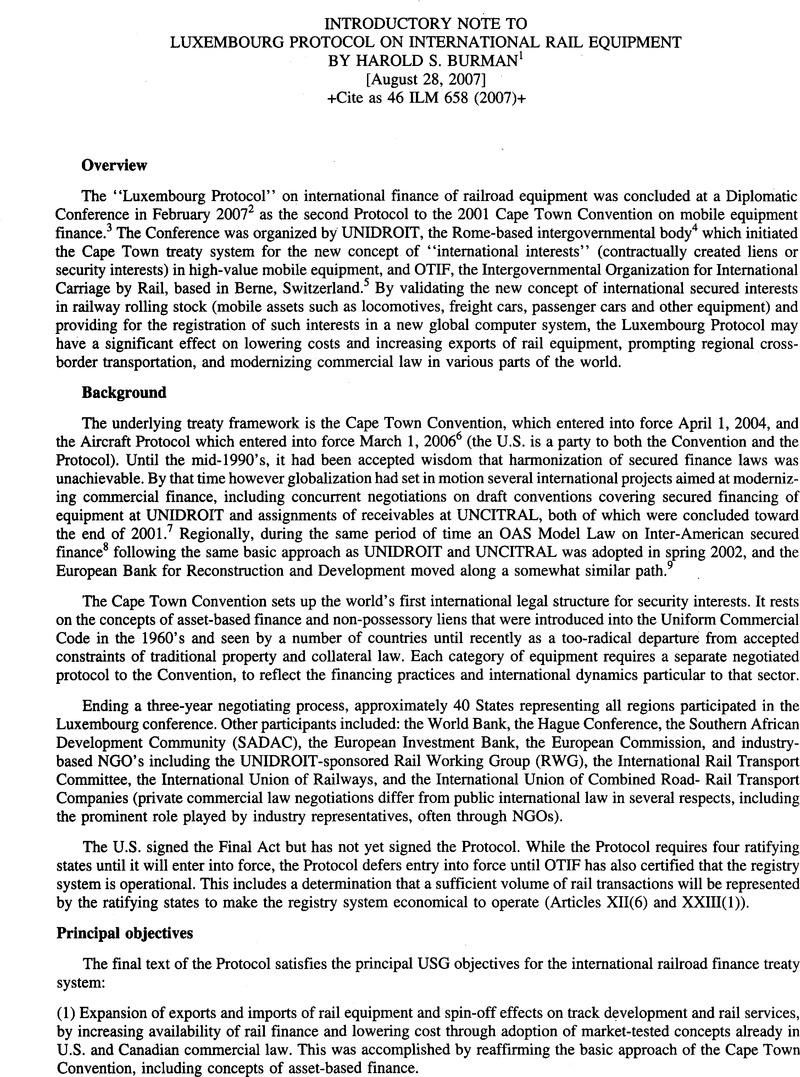No CrossRef data available.
Published online by Cambridge University Press: 27 February 2017

This text was reproduced and reformatted from the text appearing at the UNIDROIT website (visited July 23, 2007) <http://www.unidroit.Org/english/conventions/mobile-equipment/main.htm#NR2>.
1 Comments can be directed to BurmanHS @ State.gov. Steven Harris, co-reporter for Uniform Commercial Code Article 9 Revised, and Professor of law, Chicago Kent-IIT Law School, was a member of the delegation and contributed to this introduction. Other contributors were co-head of delegation Peter Bloch, Department of Transportation Office of General Counsel, and Louis Emery, member of the delegation, US Export-Import Bank, Office of General Counsel.
* This text was reproduced and reformatted from the text appearing at the UNIDROIT website (visited July 23, 2007) <http://www.unidroit.Org/english/conventions/mobileequipment/main.htm#NR2>
2 www.unidroit.org/eng/adoptedtexts/conventions/Luxembourg Protocol.§
3 The Cape Town Convention came into force April 1, 2004. www.unidroit.org/eng/conventions. The United States ratified the Convention and the Aircraft Protocol in November 2004. See Senate Treaty Doc.108-10, 108th Congress, 1st Sess.
4 Established 1926 as an auxiliary body of the League of Nations, formally the International Institute for the Unification of Private Law, later reconstituted as an independent multilateral body. The United States joined UNIDROIT in 1964.
5 Established May 1, 1985 by multilateral agreement. 42 member states (the United States is not a party), www.otif.org.
6 See UNIDROIT Official Commentary on the Convention and Aircraft Protocol, Sir Roy Goode, authorized by Resolution 5 of the Diplomatic Conference.
7 H. Burman, “The Commercial Challenge in Modernizing Secured Transactions Law”, UNIDROIT 75th anniversary Congress, 2003 Uniform Law Rev. 1-2 (Vol.VIII), pp.347 ff.
8 Organization of American States, www.oas.org/about the OAS/structure/dept of intern legal affairs/off of intern law/private international law/CIDIP VI.
9 See generally, special issue on international developments in secured finance, Uniform Law Rev. 2002-1.
10 The Association of American Railroads and related organizations in the United States, Canada and Mexico monitor the integrated North American system; www.aar.ogr. The US Department of Transportation Surface Transportation Board (STB) oversees federal interests and industry matters, www.stb.dot.gov.
11 www.icao.org. ICAO joined the UNIDROIT-initiated process and hosted multilateral meetings on the draft Convention and Aircraft Protocol.
12 42 states are currently members, primarily those of the European Union, including eastern European EU states but, with the exception of the Ukraine not other prior states of the Soviet Union, and four Near-Eastern and three North African states. There are at present no broad multilateral bodies for rail transportation that include the NAFTA states or all principal geographic regions.
13 A factor that may facilitate approval by the European Council for EU member states to adopt the Protocol, subject to whatever conditions are laid down by the Council.
14 Credit enhancement will be furthered if ratifying states also adopt the 1997 UNCITRAL Model law on cross-border insolvency cases, recently enacted in the United States as the new Chapter 15 of the US Bankruptcy Code, 11 U.S.C. 1501 et seq.
15 Having concluded the rail equipment Protocol, negotiation under UNIDROIT auspices will resume on a third protocol governing international interests in satellites and other space assets, a substantially different challenge since, unlike rail transportation which is grounded on a variety of national laws and some regional legal frameworks, commercial activity in outer space has a minimal legal structure and limited application of national law. www.unidroit.org/eng/work in progress/intern interests in mobile equipment. A fourth protocol in the initial stage of consideration, supported by the United States, would cover agricultural, construction and mining equipment.
* This text was reproduced and reformatted from the text appearing at the UNIDROIT website (visited July 23, 2007)< http://www.unidroit.Org/english/conventions/mobileequipment/main.htm#NR2>